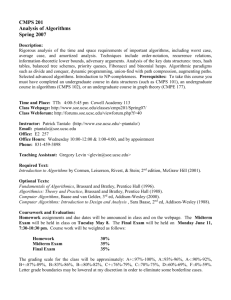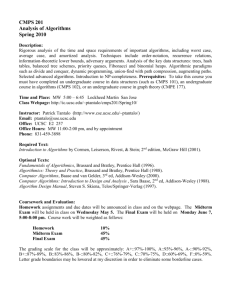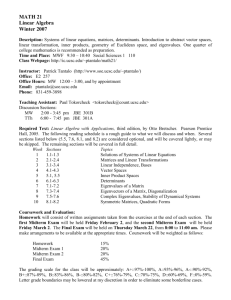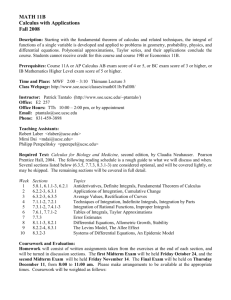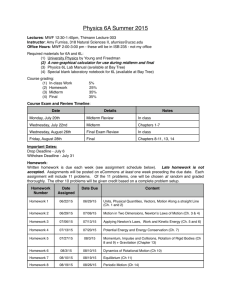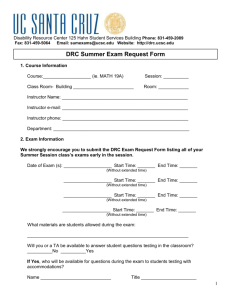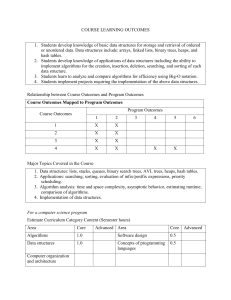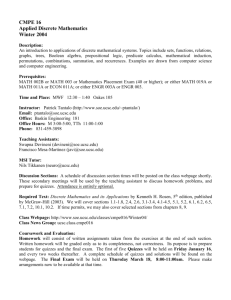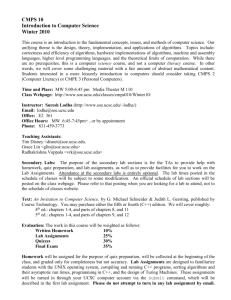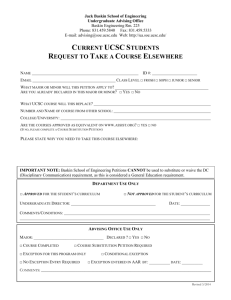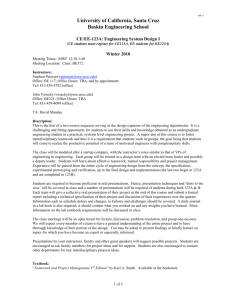CMPS 101: Algorithms & Data Types Syllabus
advertisement
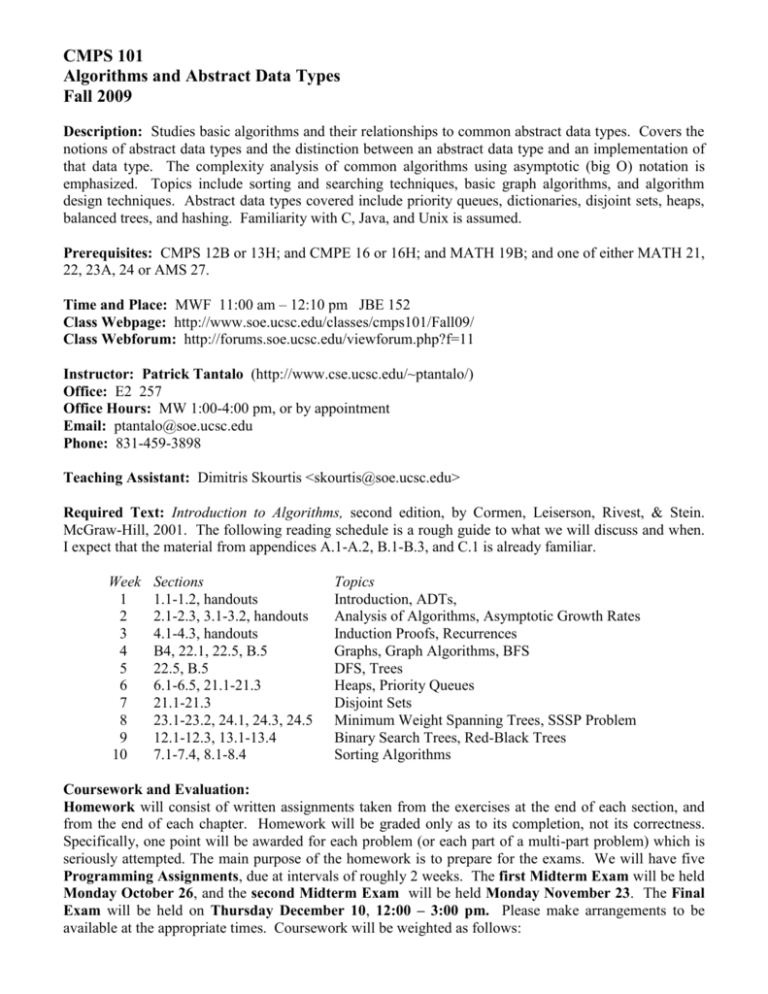
CMPS 101 Algorithms and Abstract Data Types Fall 2009 Description: Studies basic algorithms and their relationships to common abstract data types. Covers the notions of abstract data types and the distinction between an abstract data type and an implementation of that data type. The complexity analysis of common algorithms using asymptotic (big O) notation is emphasized. Topics include sorting and searching techniques, basic graph algorithms, and algorithm design techniques. Abstract data types covered include priority queues, dictionaries, disjoint sets, heaps, balanced trees, and hashing. Familiarity with C, Java, and Unix is assumed. Prerequisites: CMPS 12B or 13H; and CMPE 16 or 16H; and MATH 19B; and one of either MATH 21, 22, 23A, 24 or AMS 27. Time and Place: MWF 11:00 am – 12:10 pm JBE 152 Class Webpage: http://www.soe.ucsc.edu/classes/cmps101/Fall09/ Class Webforum: http://forums.soe.ucsc.edu/viewforum.php?f=11 Instructor: Patrick Tantalo (http://www.cse.ucsc.edu/~ptantalo/) Office: E2 257 Office Hours: MW 1:00-4:00 pm, or by appointment Email: ptantalo@soe.ucsc.edu Phone: 831-459-3898 Teaching Assistant: Dimitris Skourtis <skourtis@soe.ucsc.edu> Required Text: Introduction to Algorithms, second edition, by Cormen, Leiserson, Rivest, & Stein. McGraw-Hill, 2001. The following reading schedule is a rough guide to what we will discuss and when. I expect that the material from appendices A.1-A.2, B.1-B.3, and C.1 is already familiar. Week 1 2 3 4 5 6 7 8 9 10 Sections 1.1-1.2, handouts 2.1-2.3, 3.1-3.2, handouts 4.1-4.3, handouts B4, 22.1, 22.5, B.5 22.5, B.5 6.1-6.5, 21.1-21.3 21.1-21.3 23.1-23.2, 24.1, 24.3, 24.5 12.1-12.3, 13.1-13.4 7.1-7.4, 8.1-8.4 Topics Introduction, ADTs, Analysis of Algorithms, Asymptotic Growth Rates Induction Proofs, Recurrences Graphs, Graph Algorithms, BFS DFS, Trees Heaps, Priority Queues Disjoint Sets Minimum Weight Spanning Trees, SSSP Problem Binary Search Trees, Red-Black Trees Sorting Algorithms Coursework and Evaluation: Homework will consist of written assignments taken from the exercises at the end of each section, and from the end of each chapter. Homework will be graded only as to its completion, not its correctness. Specifically, one point will be awarded for each problem (or each part of a multi-part problem) which is seriously attempted. The main purpose of the homework is to prepare for the exams. We will have five Programming Assignments, due at intervals of roughly 2 weeks. The first Midterm Exam will be held Monday October 26, and the second Midterm Exam will be held Monday November 23. The Final Exam will be held on Thursday December 10, 12:00 – 3:00 pm. Please make arrangements to be available at the appropriate times. Coursework will be weighted as follows: Homework Programming Assignments Midterm Exam 1 Midterm Exam 2 Final Exam 5% 35% 15% 15% 30% The grading scale for the class will be approximately: A+::97%-100%, A::93%-96%, A-::90%-92%, B+::87%-89%, B::83%-86%, B-::80%-82%, C+::76%-79%, C::70%-75%, D::60%-69%, F::0%-59%. Letter grade boundaries may be lowered at my discretion in order to eliminate some borderline cases. Accommodations for Students with Disabilities If you qualify for classroom accommodations because of a disability, please get an Accommodation Authorization from the Disability Resource Center (DRC) and submit it to me in person outside of class (i.e. during office hours) within the first two weeks of the quarter. Contact DRC at 459-2089 (voice), 4594806 (TTY), or http://drc.ucsc.edu for more information on the requirements and/or process. Academic Honesty: The Baskin School of Engineering has a zero tolerance policy towards any incident of academic dishonesty. If cheating occurs, consequences within the context of the course may range from getting zero on a particular assignment, to failing the course. In addition to these sanctions, every case of academic dishonesty is referred to the students’ college Provost, who sets in motion an official disciplinary process. Cheating in any part of the course may lead to failing the course and suspension or dismissal from the university. What is cheating? In short, it is presenting someone else’s work as your own. Examples include (but are not limited to) copying another student's written homework assignment, or program, allowing your own work to be copied, or in any way facilitating the cheating of others. Although you may discuss problems with fellow students, your collaboration must be at the level of ideas only. Legitimate collaboration ends when you "lend", "borrow", or "trade" written solutions to problems, or in any way share in the act of writing your answers. You may freely give and receive help with the computer facilities, editors, the UNIX operating system, and the proper use and syntax of the C and Java programming languages; but you may not copy, paste, email, or in any way share source code. If you do collaborate (legitimately) or receive any form of help from anyone, you must credit them by placing their name(s) at the top of your paper, or in the case of programming assignments, in your README file. Please go to http://www.ucsc.edu/academics/academic_integrity/ to see the full text of the University's policy on Academic Integrity.
